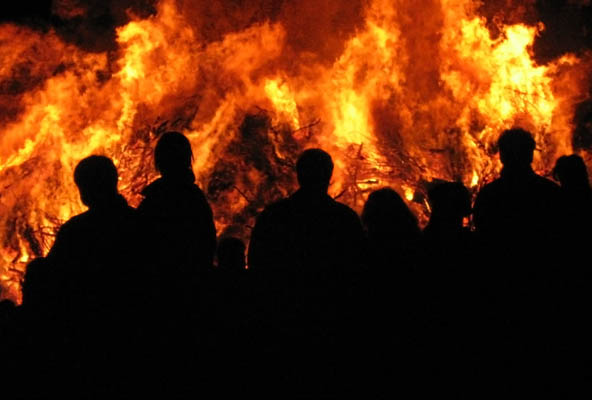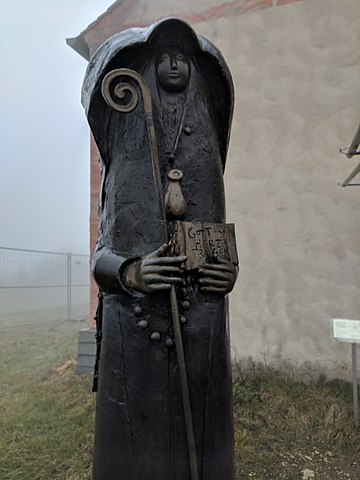Difference between revisions of "Walpurgisnacht"
Occultwiki (talk | contribs) (Created page with "400px|thumb|A ''Walpurgisnacht'' fire in Eibergen, Netherlands '''''Walpurgisnacht''''' (English: '''Walpurgis Night'''), an abbreviation of '...") |
Occultwiki (talk | contribs) |
||
| Line 20: | Line 20: | ||
==Folklore== | ==Folklore== | ||
[[File:Statue of St Walpurga.jpg|400px|thumb|Statue of Saint Walpurga outside Walburgis Kapelle in Kirchehrenbach, Germany]] | [[File:Statue of St Walpurga.jpg|400px|thumb|Statue of Saint Walpurga outside Walburgis Kapelle in Kirchehrenbach, Germany]] | ||
In modern times, many Christians continue to make religious pilgrimages to Saint Walburga's tomb in Eichstätt on Saint Walburga's Day; in the 19th century, the number of pilgrims travelling to the Church of St. Walpurgis was described as "many thousand." Due to 1 May the date of Saint Walpurga's feast, it has become associated with other May Day celebrations and regional traditions, especially in Finland and Sweden. Given that the intercession of Saint Walpurga was believed to be efficacious against [[black magic|evil magic]], medieval and Renaissance tradition held that, during Walpurgis Night, [[witch]]es celebrated a [[ | In modern times, many Christians continue to make religious pilgrimages to Saint Walburga's tomb in Eichstätt on Saint Walburga's Day; in the 19th century, the number of pilgrims travelling to the Church of St. Walpurgis was described as "many thousand." Due to 1 May the date of Saint Walpurga's feast, it has become associated with other May Day celebrations and regional traditions, especially in Finland and Sweden. Given that the intercession of Saint Walpurga was believed to be efficacious against [[black magic|evil magic]], medieval and Renaissance tradition held that, during Walpurgis Night, [[witch]]es celebrated a [[sabbat]]h and evil powers were at their strongest. | ||
In German folklore, Walpurgis Night was believed to be the night of a witches' meeting on the Brocken, the highest peak in the Harz Mountains, a range of wooded hills in central Germany. To ward off evil and protect themselves and their livestock, people would traditionally light fires on the hillsides, a tradition that continues in some regions today. In Bavaria, the feast day is sometimes called ''Hexennacht'' (Dutch: ''heksennacht''), literally "Witches' Night," on which revelers dress as witches and [[demon]]s, set off fireworks, dance and play loud music, which is said to drive the witches and winter spirits away. | In German folklore, Walpurgis Night was believed to be the night of a witches' meeting on the Brocken, the highest peak in the Harz Mountains, a range of wooded hills in central Germany. To ward off evil and protect themselves and their livestock, people would traditionally light fires on the hillsides, a tradition that continues in some regions today. In Bavaria, the feast day is sometimes called ''Hexennacht'' (Dutch: ''heksennacht''), literally "Witches' Night," on which revelers dress as witches and [[demon]]s, set off fireworks, dance and play loud music, which is said to drive the witches and winter spirits away. | ||
Latest revision as of 16:48, 4 October 2023
Walpurgisnacht (English: Walpurgis Night), an abbreviation of Saint Walpurgis Night, is the eve of the Christian feast day of Saint Walpurga, an 8th-century abbess in Francia, and is celebrated on the night of 30 April and the day of 1 May. This feast commemorates the canonization of Saint Walpurga and the movement of her relics to Eichstätt, both of which occurred on 1 May 870. The date of Saint Walpurga's canonization came to be known as Sankt Walpurgisnacht ("Saint Walpurga's night") in German.
It is suggested that Walpurgis Night is linked with older May Day festivals in northern Europe, which also involved lighting bonfires at night, for example the Gaelic festival Beltane.
Saint Walpurga
Walpurga was born in Dumnonia in 710 during the period it was becoming incorporated into Anglo Saxon England. She was the daughter of Richard the Pilgrim and was raised in Wimborne Abbey in Dorset where she became a nun. Under the mentorship of her uncle, Saint Boniface, she and her brothers evangelized to pagans in Germany, particularly in the Württemberg region. Her early education meant she was one of the few women capable of writing and she wrote an account of her brother's journey to Palestine.
In 760, she became superintendent of the Heidenheim monastery, a position she held until her death on February 25th, 777. Her canonization date was May 1st, and this has become the day most closely associated with her veneration.
Saint Walpurga was hailed by the Christians of Germany for battling "pest, rabies, and whooping cough, as well as against witchcraft." Because she was successful in converting the local populace to Christianity, they prayed to her to protect themselves from witchcraft.
The earliest representation of Walpurga is in the early 11th-century Hitda Codex, made in Cologne, which depicts her holding stylized stalks of grain. The grain attribute has been interpreted as an instance of a Christian saint (Walpurga) coming to represent an older pagan concept; in this case, the pagan Grain Mother.
Pagan origins
The date of Walpurgis Night coincided with an older May Eve festival, celebrated in much of northern Europe with the lighting of bonfires at night. A variety of festivals of pre-Christian origin had been celebrated at this time (halfway between the spring equinox and summer solstice) to mark the beginning of summer, including Beltane in Ireland and Britain.
Folklorist Jack Santino says "Her day and its traditions almost certainly are traceable to pre-Christian celebrations that took place at this time, on the first of May."
Folklore
In modern times, many Christians continue to make religious pilgrimages to Saint Walburga's tomb in Eichstätt on Saint Walburga's Day; in the 19th century, the number of pilgrims travelling to the Church of St. Walpurgis was described as "many thousand." Due to 1 May the date of Saint Walpurga's feast, it has become associated with other May Day celebrations and regional traditions, especially in Finland and Sweden. Given that the intercession of Saint Walpurga was believed to be efficacious against evil magic, medieval and Renaissance tradition held that, during Walpurgis Night, witches celebrated a sabbath and evil powers were at their strongest.
In German folklore, Walpurgis Night was believed to be the night of a witches' meeting on the Brocken, the highest peak in the Harz Mountains, a range of wooded hills in central Germany. To ward off evil and protect themselves and their livestock, people would traditionally light fires on the hillsides, a tradition that continues in some regions today. In Bavaria, the feast day is sometimes called Hexennacht (Dutch: heksennacht), literally "Witches' Night," on which revelers dress as witches and demons, set off fireworks, dance and play loud music, which is said to drive the witches and winter spirits away.
Non-Christian celebration
The Church of Satan was founded on Walpurgisnacht in 1966. Founder Anton Szandor LaVey states in The Satanic Bible that besides one's own birthday, Walpurgisnacht ranks as an important Satanic holiday, noting the Eve of May has been memorialized as "symbolizing the fruition of the spring equinox," and chose the date well aware of the date's traditional association with witchcraft.
Additionally, the Satanic Temple celebrates Hexennacht as "a solemn holiday to honor those who were victimized by superstition."
Wiccans use the name Beltane or Beltain for their May Day celebrations. It is one of the yearly Sabbats of their Wheel of the Year, following Ostara and preceding Midsummer. Unlike Celtic Reconstructionism, Wicca is syncretic and melds practices from many different cultures. The Wiccan Beltane is more akin to the Germanic/English May Day festival.
In popular culture
From Bram Stoker's short story, Dracula's Guest, an Englishman (whose name is never mentioned) is on a visit to Munich before leaving for Transylvania. It is Walpurgis Night, and in spite of the hotelier's warning not to be late coming back, the young man later leaves his carriage and wanders toward the direction of an abandoned "unholy" village.
The H. P. Lovecraft story The Dreams in the Witch House features a man having many unsettling dreams and visitations from a witch, a familiar, and a demonic entity. These dreams culminate in a child sacrifice which occurs on Walpurgisnacht.

